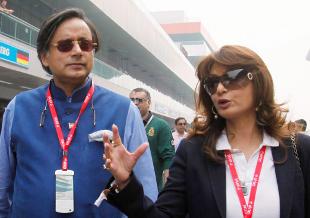 New Delhi, Jan 23: The mystery over Sunanda Pushkar's death deepened on Wednesday with the latest revelation hinting at a scuffle before her death.
New Delhi, Jan 23: The mystery over Sunanda Pushkar's death deepened on Wednesday with the latest revelation hinting at a scuffle before her death.
In the latest details emerging out of Sunanda's forensic report, a deep bite mark was found on her hand. Her upper extremity was dotted with over a dozen of injury marks on hand, an arm, chin, and neck and these were termed as 'scuffle marks', sources said.
The autopsy report of Sunanda has attributed her death to poisoning by drug overdose, while ruling out the 'scuffle marks' as minor injuries.
However, the scuffle marks may impact the investigation as the Delhi Police has been directed by the sub-divisional magistrate to probe whether it was a suicide or a murder.
The police meanwhile urged the Central Forensic Science Laboratory (CFSL) to speed up on Sunanda's viscera report, which might have clues to the mystery.
Reacting on the issue, NCP leader DP Tripathi said that Union Minister Shashi Tharoor must quit till the investigation is over.
However, the Congress has rejected any such remark, saying there was no question of resignation.
Congress spokesperson Randip Surjewala, at the AICC briefing, said, "Tharoor is in a responsible ministerial position. He is also an inseparable part of Congress. There is no question of his resignation".
Sunanda's son from her second marriage, Shiv Menon had yesterday issued a statement, denying any possible role of Shashi Tharoor in his mother's death.
"Do not believe that Shashi was capable of harming her let alone the speculation that he could have taken her life."
“Shashi Tharoor would never physically abuse my mother. Though there were differences between them they were deeply in love with each other,” he added. Shiv rubbished any foul play in her death attributing it to “an unfortunate combination of media stress, tensions and a wrong mix of different medications."
Tharoor's wife Sunanda was found dead in Hotel Leela Palace on Jan 17, just a couple of days after an open spat on Twitter that threw spotlight on the couple's personal life and a Pakistani journalist Mehr Tarar.





Comments
Add new comment